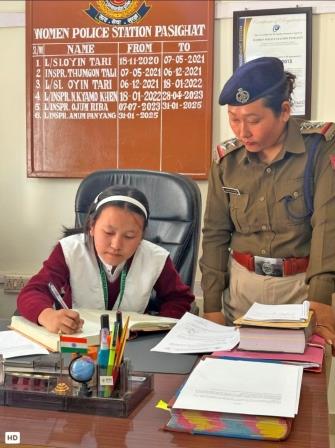-
 Arunachal tableau on R-Day spotlights state’s emergence as Adventure Capital…
Arunachal tableau on R-Day spotlights state’s emergence as Adventure Capital…
-
Etalin marks National Voters’ Day, encourages youth participation in democracy
-
Sona reviews PMGSY, VVP projects in Itanagar Circle
-
Lok Bhavan celebrates UP Diwas
-
 KGBV student leads WPS Pasighat on National Girl Child Day
KGBV student leads WPS Pasighat on National Girl Child Day
-
Meritorious students felicitated on National Girl Child Day
-
Awareness on POCSO held as part of National Girl Child…
-
Anini certifies 79 Nature Guides on National Tourism Day
-
 Startup success stories reflect potential of state’s youth: CM
Startup success stories reflect potential of state’s youth: CM
-
 Mein participates in vintage Willys Jeep Rally, inaugurates World War…
Mein participates in vintage Willys Jeep Rally, inaugurates World War…
One out of every seven Indians is affected by a mental disorder- it’s a startling fact that has emerged from a paper published last week in Lancet Psychiatry, the globally well-known and seriously-taken journal dealing with the subject. The study has underlined that 19.73 crore or 14.3 % of the nation’s population, as on 2017, had been under the grip of a mental disorder, by whatever name known medically. The paper has highlighted some worrisome details, but what is really alarming is that the proportional contribution of mental disorders to the total disease burden in India has almost doubled during 27 years, if 1990 is taken as base year. There are various factors which have contributed to this silent yet steady rise. If social stigmas associated with the treatment part are unmistakable causes, the paper also shows that so far as implementation rate of available mental health services in the country is concerned, they are still poor by global standards. Now that the report has hit hard, no less than a shock altogether for any common citizen, it will be interesting to observe how responds flow from stakeholders, with government being the principal one and what actions are initiated to make the country mentally more healthy.
Among the categories of mental diseases enumerated in the paper, most of which are difficult to spell even for most people, leave aside understanding their medical implications, depression and anxiety disorders have been found to be most common and widely prevalent. In numerical terms, which makes understanding a bit easier, it actually mean approximately 4.57 crore Indians had depression and 4.49 crore had anxiety disorders, in some degree or the other as on 2017. There is also an unsettling addition to this which points out that prevalence of the above two disorders has been observed to be higher in females than in males. The reasons here are normative by nature in pan-national context. These are rampant gender discrimination, domestic violence, sexual abuse and countless numbers of adverse socio-cultural practices which still continue flourishing. Comments have started flowing and significantly, the unanimous call has been to act fast with stress on improving and expanding the community-level mental health care delivery system and integrating mental health services with the overall public health delivery system on priority basis. These findings can be a guiding light if taken seriously since it can help in directing the efforts in right directions.
Agreeing with all these words of wisdom, a thought must also be given- how to make the nation a better place to live. For that, based entirely on common sense, won’t it be logical to suggest in creating an environment that will engage the populace wholeheartedly in ‘meaningful engagements’ only ?

Kenter Joya Riba
(Managing Editor)She is a graduate in Science with post graduation in Sociology from University of Pune. She has been in the media industry for nearly a decade. Before turning to print business, she has been associated with radio and television.
Email: kenterjoyaz@easternsentinel.in / editoreasternsentinel@gmail.com
Phone: 0360-2212313

